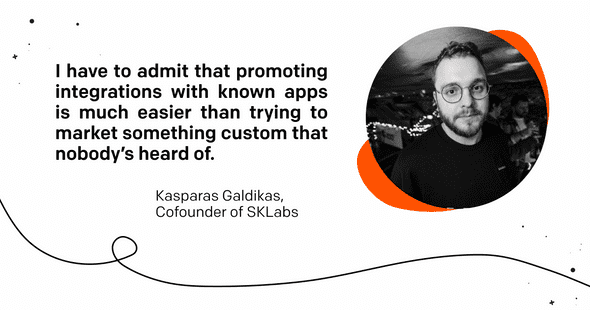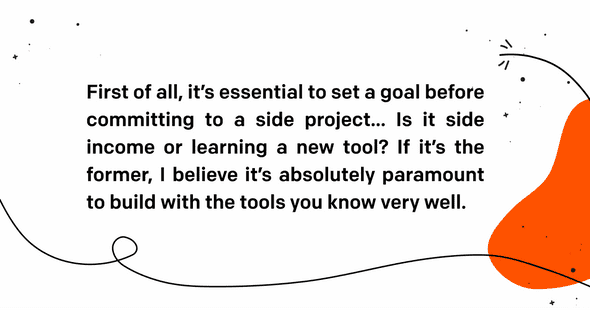SKlabs is the author of seven apps, which are available on the LiveChat Marketplace. Last year, they reached the milestone of $1,000 Monthly Recurring Revenue (MRR) and are close to repeating it this year too. In this interview, they share their perspective on building apps with the LiveChat Developer Program, their experiences good and bad, and advice for future developers.
LiveChat: How many people are there behind SKlabs? Is it a one-man army or a team? Is building LiveChat apps a side hustle for you?
SKlabs: We’re currently a team of two, both working remotely. SKlabs is a side hustle for us as we both have full-time jobs. But it’s always good to work on “pet projects” and either learn something new or make some passive income.
LiveChat: Why did you decide to build with the LiveChat Developer Program? Was there any factor that convinced you?
SKlabs: LiveChat isn’t the first platform we took into account. Other major players have marketplaces too; however, they are very crowded, and it’s hard to put yourself out there. We felt that the LiveChat Marketplace was still up and coming and there were plenty of apps we could build for it — a lot of opportunities.
Also, being a smaller marketplace/developer program meant a closer relationship with the internal team. We love the fact that we have a shared Slack channel where we can get feedback, get notified about bugs, or be involved in other parts of LiveChat projects, such as user interviews. It feels a bit like we’re part of the organization even though we’re an external team.
LiveChat: Could you tell us a bit more about the applications you’ve released on the LiveChat Marketplace? How many are there? When did you release your first app?
SKlabs: We currently have seven apps live: Zoom, GoToMeeting, Trello, GitHub, Discord, MS Teams, and Ping. The first app we released was Zoom, which was published in November last year.
LiveChat: How do you come up with ideas for your apps?
SKlabs: The majority of the apps we’ve built are integrations with other apps. We would scout the LiveChat Marketplace for apps that we use day to day (Zoom, Trello, etc.) and see if there was an integration for it. Also, we’d explore marketplaces from similar products and see what we could bring to LiveChat. We wanted to start out this way, as integrating something you know or use every day ensures a tight project scope, which may lead to low effort with high reward.
LiveChat: Do your apps differ in terms of technology? Which LiveChat APIs/SDKs did you make use of when building your apps?
SKlabs: Our main tech stack consists of Laravel (PHP) and React. Laravel powers our backend, which is responsible for installations, webhook handling, authentication, authorization, and services for the React UI. All our apps use the LiveChat Design System to make them look as close to the first-party app as possible.
Also, it was crucial for us to ensure that we would create a framework to help us build other apps quicker. For example, a lot of functionality, such as webhook handling, installations, authentication is the same across all our apps, so why not reuse that? In terms of the LiveChat SDKs we use, the primary one is Accounts SDK. In one of the apps, we also used the In-App Upgrades feature, which allowed us to introduce the concept of packages — the user pays a basic monthly fee but can optionally enable premium features by purchasing a package.
LiveChat: What challenges did you have to overcome in the whole application development process?
SKlabs: When we started building the first app (Zoom), it was hard to understand LiveChat’s domain model. What is a license? How do agents belong to a license? What happens when an app is installed? How do we deal with authentication or access scopes? And so on … It took a little while to figure it out, but LiveChat has thorough documentation that answered most of our questions.
LiveChat: Were there any unexpected blockers? How did you solve them?
SKlabs: One of the blockers we faced during the first app launch was Safari and third-party cookies. LiveChat serves/embeds the apps within an iFrame, which is problematic on Safari since it has very strict policies on browser cookie sharing. It meant that none of the users were able to authenticate in our app while using Safari. It was definitely not something we wanted to deal with right before finishing app development. To solve it, we had to rethink our app’s internal authentication mechanism, which led to our changing core parts of our backend framework.
Another challenge was dealing with Zoom’s OAuth app review and approval process — it took way longer than we anticipated, but eventually we got there.
LiveChat: Which tools from the whole LiveChat infrastructure proved to be most useful when building apps?
SKlabs: The building blocks for creating an app have been especially useful. It’s really nice how self-guided it is.
LiveChat: How do you handle the marketing and promotion of your apps? Was there anything that turned out to be exceptionally successful in boosting the sales of your app?
SKlabs: Marketing is the hardest part of this, although building for established marketplaces eases some of the burdens. In the case of building with LiveChat, it’s the LiveChat team that’s responsible for ensuring good discoverability of the apps, good SEO, which makes things easier for the app author.
I have to admit that promoting integrations with known apps is much easier than trying to market something custom that nobody’s heard of. We tried that with our app Ping, which is a notification app helping you route various events from LiveChat to platforms like MS Teams, Discord, Slack, and others. It’s currently our most complex app, but it brings the least amount of revenue.
For other apps, like Zoom, getting help from LiveChat to get featured in the Marketplace campaigns certainly helped to boost installations and revenue. Also, if a client churns, we sometimes reach out to them offering a discount to try and reel them back.
LiveChat: Have you reached any milestones in terms of app installation rate, revenue, etc.?
SKlabs: The Zoom integration is our most successful app at the moment. We had a goal to reach 100 installations, and we’re getting pretty close to that with 85 installations to date. In terms of revenue, we had a goal to reach $1k MRR, which we did last year — however, one of the biggest clients has churned, which took away the majority of our revenue. But we’re steadily climbing back up, and with the recently published apps, we may be able to achieve our objective by the end of the year.
LiveChat: If you were to start over with building apps for LiveChat, would you do anything differently? Based on your experience, could you give any advice to the developers who are just starting out with building and monetizing LiveChat apps?
SKlabs: When we built our first app, we didn’t know the platform very well, especially the core parts: installation and authentication. It took a few attempts to get it right, so that it scales as we add more apps to our portfolio.
As for advice, I have a couple of thoughts.
First of all, it’s essential to set a goal before committing to a side project. What do you want to get out of it? Is it side income or learning a new tool? If it’s the former, I believe it’s absolutely paramount to build with the tools you know very well. You want to be as productive as you can because it’s likely that your time’s limited — an evening here and there, in-between your personal life.
Secondly, if a project takes too long or you run into roadblocks, it can often demotivate you, and you end up abandoning the project. Whilst you still can learn new tools and frameworks and build with the goal of generating side income, it’s important to be realistic. Exploring too many new tools could easily lead to unfinished projects. Aim to ship a project, even if it means descoping some of the features or technologies you were planning to introduce. When you get your first customer and you see them use your app, it’s extremely satisfying and motivating. Before you know it, you’ll be onto the next app idea.
Also, think about how your app/infrastructure could scale in the future beyond the one app that you’re going to build. It may be premature to think about it that early in the process, but it will certainly help if it’s not your last app.
Finally, if you’ve already built your first app, review it thoroughly and see what you can re-use.
LiveChat: I think those were great pieces of advice to leave our readers with.

